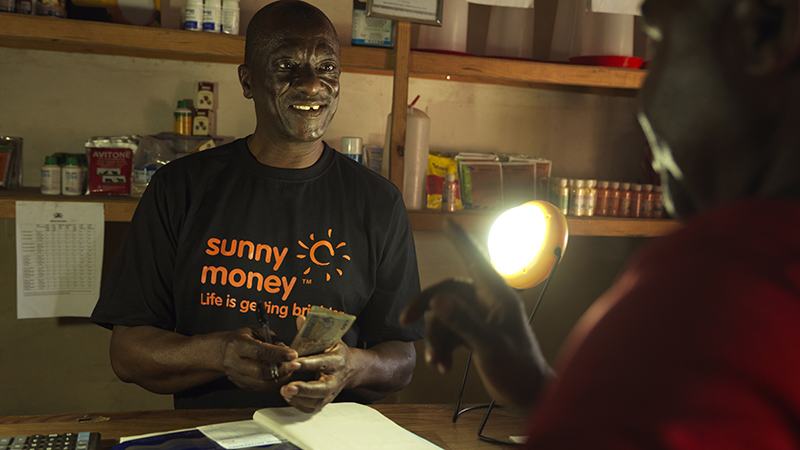Small, affordable solar technology can provide clean, reliable power to the 600 million Africans who live without access to electricity. As part of Matthew Snell's doctoral research at the University of Huddersfield, he is investigating an innovative social enterprise that aims to spread the technology, which provides lighting and can power up mobile phones, laptops and other devices.
Photo: A rural trader lights his stall using solar power. Credit: Lendwithcare/Peter Caton
Matthew Snell – who has long and varied experience working in Africa – is a research projects manager at Huddersfield Business School's Centre for Sustainability, Responsibility, Governance and Ethics (SURGE). His role includes the management of a project focused on the conservation of forests and wild coffee in Ethiopia.
He has also embarked on doctoral research into a social enterprise that focuses on the distribution of ‘pico solar’ products.
“These have a power output that is less than 10 watts, using photovoltaic cells to generate electricity from sunlight,” explained Mr Snell. “They provide light as well as mobile phone charging capacity.”
Study Sustainability and Environmental Management at Huddersfield
The social enterprise is Sunny Money, established in 2008 by the NGO Solar Aid. Currently working in Uganda, Malawi and Zambia, it has developed various methods to distribute pico solar products to Africans who have no grid-based source of electricity, meaning that they resort to candles, kerosene, wood, torches and car batteries to generate light and heat.
Tracking how social enterprises adapt
As pico solar technology has developed, so have the business models adopted by Sunny Money and Mr Snell has been monitoring this evolutionary process for his PhD thesis, due for completion in 2022.
“I am interested in understanding how they as a social enterprise are almost continuously trying to adapt and innovate in a rapidly changing context and operating environment,” he said.

For example, Sunny Money has developed a network of agents with a variety of “day jobs” such as farming, labouring or other piecemeal work, who supplement their income by distributing pico solar products, on a model that Mr Snell compares to the tried and tested “Avon ladies” system. Also, community health workers distributing medical supplies can include solar lighting equipment in their kit.
Mr Snell’s career has included long stints in various sub-Saharan African countries, working for a variety of international organisations. He was based in Zambia for three years and during his PhD research he has met and interviewed a wide range of Sunny Money staff figures, from the chief executive to sales co-coordinators and educational outreach workers.
In addition to charting the development of Sunny Money, he hopes his findings will have wider social and economic relevance.
“My hope is that lessons will be learned from the innovations that Sunny Money has piloted. Some of their innovations can be used for practitioner-led work by other social enterprises working in a variety of sectors, including energy. They can appraise about what has worked and what has been more of a challenge.”
Local food producers to the fore in lockdown
A new University report charts the rise to prominence of local suppliers and farm shops who rose to the challenge.
A sustainable future for Ethiopia’s forests
A long-term £5 million+ project is helping rural communities in Ethiopia make a sustainable living from its precious forests.
Life-saving lullabies to spread COVID warnings
A team of researchers is working with a group of women in Zambia to create songs to warn against the dangers of coronavirus.
